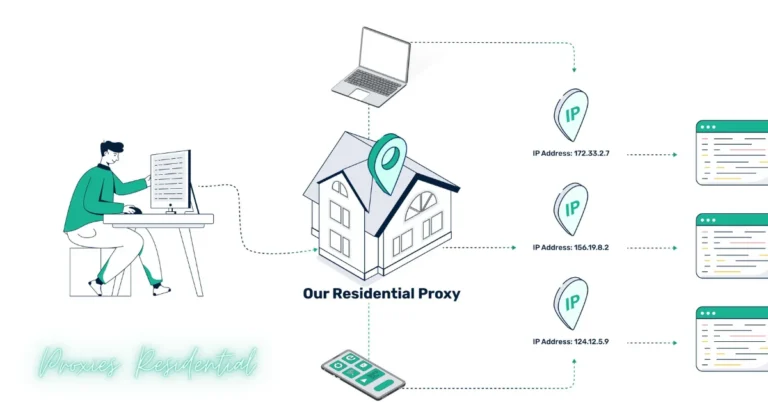In today’s digital age, protecting your online identity has never been more crucial. With hackers lurking around every corner and data breaches becoming alarmingly common, safeguarding your personal information is a top priority. Enter proxies residential: the unsung heroes of online anonymity. These powerful tools act as intermediaries between you and the web, helping to shield your identity while browsing or accessing content.
But what exactly are these proxies? And how can they enhance not just your privacy but also your internet experience? Whether you’re looking to access geo-restricted content or simply keep prying eyes at bay, understanding the world of residential proxies could be a game-changer for you. Let’s dive into what makes them essential in our interconnected lives!
What is a proxy and why is it important?
A proxy is essentially an intermediary server that sits between your device and the internet. When you connect to a proxy, your requests are rerouted through it before reaching the intended website. This means that the site only sees the IP address of the proxy rather than your own.
The importance of proxies cannot be overstated. They help maintain online privacy by masking your real IP address, making it much harder for websites and advertisers to track your behavior.
Additionally, proxies can bypass geographical restrictions on content. If you’re trying to access services or media not available in your area, a proxy allows you to appear as if you’re browsing from a different location.
Security is also enhanced; many proxies encrypt data transfers, protecting sensitive information from potential threats while surfing the web.
Types of proxies available (datacenter, residential, mobile)
Proxies play a crucial role in online activities, with different types catering to specific needs.
Datacenter proxies are fast and reliable. They originate from data centers rather than residential locations. This makes them ideal for tasks requiring speed but lacking the anonymity of residential options.
Residential proxies offer a distinct advantage by routing through real IP addresses provided by internet service providers. This makes them less detectable and perfect for web scraping or accessing geo-restricted content.
Mobile proxies, on the other hand, use mobile IP addresses assigned to smartphones. Their unique feature is that they mimic mobile network traffic, making them useful for testing apps or simulating user behavior on various mobile platforms.
Each type serves different objectives based on speed, security, and anonymity preferences. Choosing wisely can significantly enhance your online experience while keeping you safe.
The benefits of using residential proxies
Residential proxies offer a shield against prying eyes. They mask your IP address, making it harder for websites to trace your online activities back to you. This added layer of anonymity is vital for anyone concerned about digital privacy.
They can help bypass geo-restrictions too. With residential proxies, you can access content that might be blocked in your region. Streaming services or local news sites become readily available with just a few clicks.
Speed is another benefit worth mentioning. Many residential proxies operate on high-quality connections, ensuring fast data transfer rates without lagging.
Moreover, they are less likely to get blacklisted compared to datacenter proxies. Websites generally view traffic from residential addresses as legitimate users rather than bots or scrapers.
Using residential proxies can enhance security while browsing the web, allowing you to engage freely and confidently online without fear of exposure.
How to use residential proxies for anonymity and security
Using residential proxies for anonymity is straightforward. First, choose a reliable service provider that offers a pool of real IP addresses. This ensures you’re browsing from multiple locations without revealing your true identity.
Once you have access to the proxies, configure your browser or application settings to use them. Many tools offer easy integration options and detailed setup guides.
When surfing the web, these proxies mask your original IP address. They make it appear as if you’re accessing content from different regions worldwide. This can help you bypass geo-blocks and access restricted sites effortlessly.
For enhanced security, consider using HTTPS connections whenever possible. This adds an extra layer of encryption, protecting your data while in transit.
Additionally, be mindful of your online activities. Engaging in responsible browsing habits will maximize the benefits of using residential proxies for both anonymity and security measures.
Common misconceptions about residential proxies
Many people hold misconceptions about residential proxies. A common belief is that they are illegal or unethical. In reality, these proxies use real IP addresses assigned to actual devices. This makes them perfectly legitimate.
Another misunderstanding involves their efficacy in bypassing restrictions. Some assume that all proxies work the same way, but residential proxies excel in this area due to their connection to real homes rather than data centers.
Cost is often a point of contention as well. Many think that residential proxies are prohibitively expensive and only for the tech elite. However, there are various pricing plans available suitable for different budgets.
Some users worry about speed issues with residential options compared to datacenter ones. While it’s true that speeds can vary, many high-quality providers offer fast connections without sacrificing anonymity or security.
Top providers of residential proxies
When it comes to residential proxies, choosing the right provider is crucial. Some companies stand out in this crowded market.
Bright Data (formerly Luminati) offers a massive pool of IPs sourced from real users. Their services are reliable and feature-rich, catering to various needs.
Smartproxy provides an intuitive interface along with competitive pricing. They focus on ease of use while ensuring strong security measures for anonymity.
Oxylabs boasts high performance and stability with its large proxy network. Their dedication to customer support makes them a popular choice among businesses.
Another noteworthy option is ProxyRack, which emphasizes flexibility in plans. They offer both rotating and static residential proxies tailored for diverse applications.
Each provider has unique strengths that can meet different user demands effectively. Exploring these options can lead you to the ideal solution for your specific requirements.
Conclusion: Protect your identity with the help of residential proxies
Protecting your identity in the digital world is more crucial than ever. With online threats lurking around every corner, it’s essential to take proactive measures. Residential proxies offer a valuable layer of security and anonymity that standard browsing cannot provide.
By using residential proxies, you can mask your real IP address with one from a legitimate home network. This not only enhances your privacy but also allows for safer web scraping, data collection, and bypassing geographical restrictions. As cyber threats evolve, so should our strategies for preserving personal information.
Choosing the right provider can significantly impact your experience with residential proxie,s. Look for those offering robust features like high-speed connections and reliable customer support.
Embrace the power of residential proxie,s to navigate the internet securely while maintaining control over your personal data. Your online safety depends on it.
FAQs
Q: What are residential proxie,s?
Ans: Residential proxie,s are IP addresses assigned to physical devices, making your online activity appear more authentic.
Q: How do residential proxie,s protect my identity?
Ans: They mask your real IP address, preventing hackers or trackers from accessing your personal information.
Q: Who benefits from using residential proxie,s?
Ans: Both individuals seeking privacy and businesses requiring secure web scraping or data access benefit greatly.
Q: Are residential proxie,s legal to use?
Ans: Yes, residential proxie,s are legal, provided they are used ethically and do not violate any platform’s terms.
Q: How are residential proxies different from datacenter proxies?
Ans: Residential proxies use real device IPs, while datacenter proxies rely on virtual IPs, making residential ones harder to detect.

